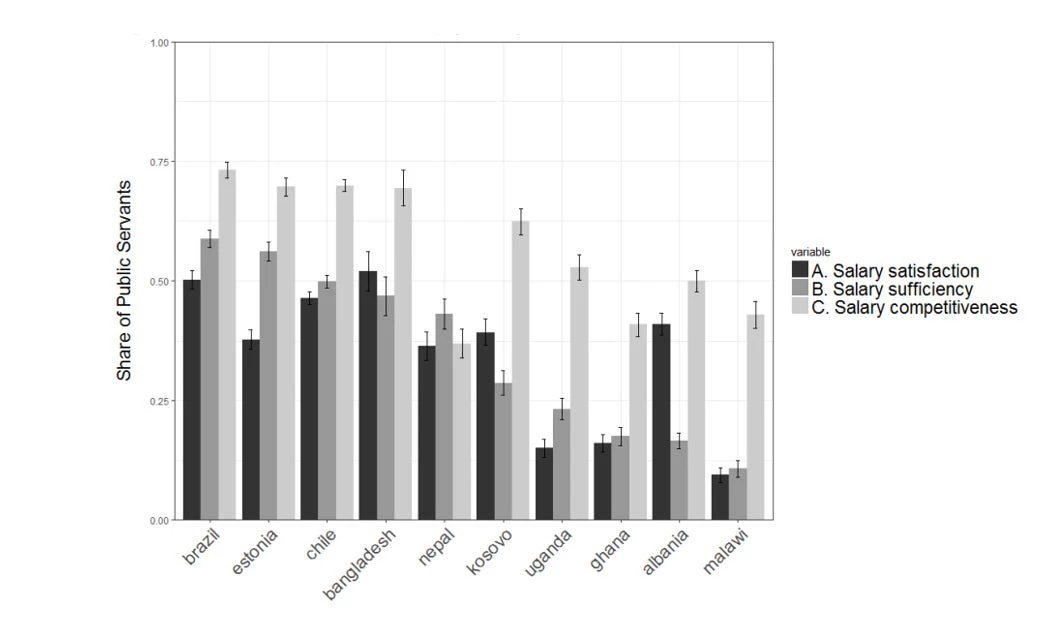
Editor's note: This blog post is part of a series for the 'Bureaucracy Lab', a World Bank initiative to better understand the world's public officials.
Governments can only be effective if the people in government – that is its civil servants – are motivated and able to implement policy and services well. In many developing countries, this remains a remote aspiration. Corruption, lack of staff motivation and poor performance are both popular stereotypes and real-world facts. For many decades, international aid programmes have invested in civil service reform to change this reality. The track record of these reform programs has unfortunately been poor.
Reform progress has been hampered in part by the lack of robust evidence on ‘what works in civil service management’. How can institutions manage people in developing country governments in ways that enhance motivation and performance, while reducing corruption? Several recent studies have looked at specific interventions in particular countries (see here, here and here, for instance). However, what works across countries and civil service management practices has been less clear.
To shed light on this, we surveyed 23,000 civil servants in Africa, Asia, Latin America and Eastern Europe (with funding from the British Academy – UK Department for International Development (DFID) Anti-Corruption Evidence Programme).[i] This is the largest published cross-country survey of civil servants in developing countries to-date.
What can we learn from the survey data about how to manage civil servants to get a more motivated, committed and ethical civil service? The statistical analyses of our survey data (detailed in our recent report) underscore that getting three basics right has consistent positive effects:
1. Prioritize professional merit over political and personal considerations in civil service management decisions. Civil servants who are recruited or promoted through political or personal connections (for instance through support from friends and family) engage more frequently in corruption on the job, and perform more poorly. Our survey suggests that the politicization and personalization of civil service management decisions is far from uncommon. In the ten countries surveyed, 41% of civil servants got their first job at least in part thanks to personal connections; for 34% of civil servants, they helped them get promoted and for 22% they mattered for their pay rises. At the same time, 20% had help from political connections to get recruited and promoted, and 15% to get pay rises.

On an upside, our survey data also points to a clear antidote against politicization and nepotism in civil service management decisions. Formal ‘merit’ procedures curb politicization and nepotism in civil service management: for instance, publicly advertising public sector jobs and systematically assessing candidates through written examinations and personal interviews. By curbing nepotism and politicization, these procedures intermittently help enhance performance and integrity among civil servants in developing countries.
2. Ensure that performance management systems genuinely promote performance-oriented civil service management decisions. Contrary to popular stereotypes, our data suggests that civil servants appreciate performance-oriented civil service management: they are more satisfied and perform better when they sense that hard work matters for their promotion prospects, pay raises or job stability. Formal performance management systems are often introduced to give civil servants the sense that performance matters. In our data, we assess whether one component of such systems – performance evaluations – create this perception.We find that they do, but that this effect depends on whether they are implemented well. Where performance is evaluated against objectives identified in advance and where performance results are perceived to matter for promotions, pay rises or job stability, performance evaluations have positive effects. Where this is not the case, the opposite is the case – performance evaluations hurt performance perceptions and thus intermittently civil service performance and motivation.
3. Pay enough to retain more motivated civil servants and prevent large-scale turnover of high performers. Most civil servants in developing countries are concerned about their pay. In our survey, only 37% of civil servants are satisfied with their salary; and only 40% think that their salary alone is sufficient to sustain their household. However, this does not seem to imply that higher pay motivates staff: in our data, it is not associated with greater work motivation. However, we do find an indirect positive effect of pay.
More motivated civil servants are found to have better-paid job opportunities outside the public sector, and civil servants with better outside job offers in turn are more intent on leaving public sector institutions.Paying more motivated civil servants enough to retain them is thus important to safeguard civil service performance. This, however, does not suggest the need to pay everyone more. In fact, only a minority of civil servants (39%) in our survey would find it easy to find a better-paid private sector job. Public sector institutions would do well to target pay rises, and do so after assessing turnover and performance data.
Civil servants’ salary perceptions
Implementing these three practices are, of course, not the only ones that matter for more effective civil services. Our data, however, suggests that they are important “basics” that should be consistently in place across public sector institutions. These “basics” are remarkably consistent with the World Bank’s – and other lender’s – traditional civil service reform agenda. The failure of these reforms might thus stem more from implementation failures and political obstacles than design.
One important caveat is due: our data shows that the attitudes and behaviours of civil servants and the way they are managed vary sharply across public sector institutions within countries. Other surveys show similar patterns. On which “basic” civil service reforms countries should focus on therefore depends on the institutional realities that the reforms seek to change.
For policy-makers, this implies a need to engage in systematic evidence gathering on existing civil service management practices and civil servant attitudes, using tools such as civil service surveys, before designing reforms to shape the attitudes of civil servants for the better. Given the large variation in management practices and civil servant attitudes, reforms are likely to be more effective where they are targeted to individual institutions – rather than the public sector as a whole.
Suggested Tweets
- How can institutions manage ppl in developing country govts in ways that enhance motivation and performance while reducing corruption? Read the main findings of this comprehensive study!
- 23,000 civil servants were surveyed to find out how to improve civil service mgmt. Study finds that developing country govts need to get 3 basics right to better manage their civil servants. Find out what they are.
- What can we learn from survey data on how to manage civil servants to get a more motivated, committed and ethical civil service? Statistical analyses from survey data underscore that getting 3 basics right has positive effects





Join the Conversation